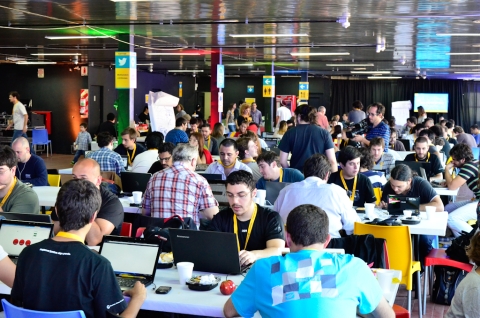
A participant in a recent hackathon outlines her experience, an ICFJ Knight Fellow is featured on a media technology podcast and more from the Knight Fellows in this week’s roundup.
Hacks/Hackers Buenos Aires hosts UXathon
Hacks/Hackers Buenos Aires, co-founded by ICFJ Knight Fellow Mariano Blejman, held a UXathon: a hackathon on user experience. Click here to read (in Spanish) about Luciana Godoy’s experience as a first-time participant.
Podcast on the changing landscape of media technology
ICFJ Knight Fellow Christopher Guess, based in Bosnia, is helping watchdog centers for crime and corruption to grow and become more sustainable. All of these centers are members of the Organized Crime and Corruption Reporting Project in central and eastern Europe. Listen to his interview on innovation, journalism and technology, in the U.S. and internationally, on the Turkish Girişimci Muhabbeti podcast.
I was interviewed about innovation, journalism and technology last month for @girisimciMU https://t.co/DWBPdvekhe @ICFJKnight
— Christopher Guess (@cguess) June 1, 2015
Holding Mexican political candidates accountable for their past
Animal Político and Cargografías, a HacksLabs grantee, launched #CargografiasDF, a tool which provides information on candidates running for delegate positions in Mexico City's June 7 election. The interactive tool incorporates technology from Cargografías and tracks politicians’ positions in government, salaries and party affiliations using an interactive timeline.
Are there two single women for every man in Cape Town?
Does this urban legend hold any truth? Bruce Bassett, head of the Cosmology research group, worked with his team at last month’s Data Quest to uncover the "true" story. At the event, which was hosted by Code for South Africa and Govhack, Bassett's team broke into the census data to crunch the numbers. Here is a post he wrote on the results.
Exposing the Mafia's hidden assets in Africa
The African Network of Centers for Investigative Reporting (ANCIR) and the Investigative Reporting Project Italy (IRPI) created an online archive of the documents that helped them track the Mafia's secret ownership of everything from diamond mines to nightclubs, game farms and luxury country estates in Africa. These 108 documents are hosted on ANCIR's #sourceAFRICA platform, a resource that allows users to comment on the documents and help ANCIR and IRPI find new leads. View the #MafiaAfrica investigation here.
What else the fellows have been up to
-
ANCIR's #sourceAFRICA, created by ICFJ Knight Fellow Justin Arenstein and Code for Africa, developed a beta WordPress plugin and oEmbed so you can embed their resources on your own site. Download it here.
-
What should journalists learn from the Rolling Stone's November story on campus rape? Heinrich Böhmke, a legal advisor to ANCIR, shared some insights with the Global Investigative Journalism Network.
-
The Indigo Trust features Code for South Africa’s Mapping Cape Town’s Budget project.
This post is also published on IJNet, which is produced by ICFJ.
Main image CC-licensed by Flickr via Laboratorio de Gobierno de la Ciudad de Buenos Aires.